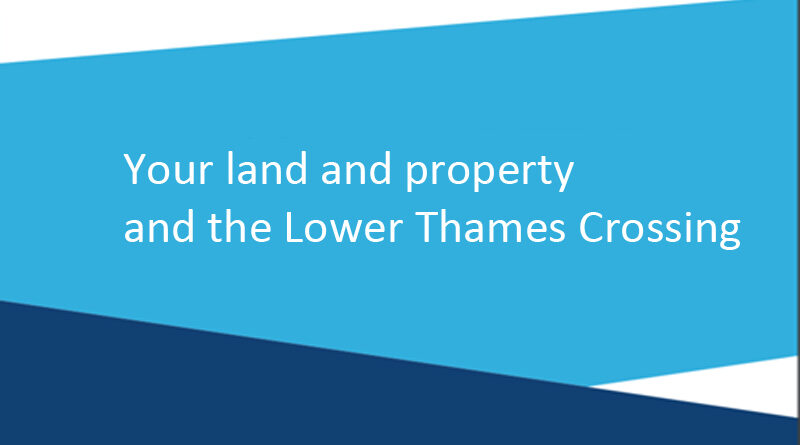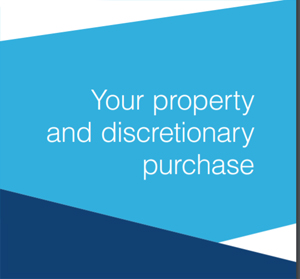
Your Property/Land – LTC
Unfortunately there are many properties that are and would be affected by the proposed Lower Thames Crossing. There are various ways in which the LTC can impact on your property/land. We have managed to get some info that we hope helps those who sadly find themselves in this position.
We fully appreciate how distressing these circumstances can be, and the impact it can have on people’s mental health and well-being, and therefore also share The Samaritans phone number – 116 123(free anytime from any phone) for those who may feel the need. Please do reach out to someone if you need to.
Options currently available:
 Blight - NH booklet
This fund has been available for use since the LTC preferred route was announced in 2017. Owners of land/property that are within the development boundary are able to ask NH/LTC to buy their property by serving a blight notice on NH.
A property is considered blighted when its value is reduced as a result of the project and the owners are unable to sell the property at market value. NH/LTC purchase blighted properties at their unaffected market value; this is the amount the property would be worth if the project did not exist, not the blighted (lower) value.
Blight - NH booklet
This fund has been available for use since the LTC preferred route was announced in 2017. Owners of land/property that are within the development boundary are able to ask NH/LTC to buy their property by serving a blight notice on NH.
A property is considered blighted when its value is reduced as a result of the project and the owners are unable to sell the property at market value. NH/LTC purchase blighted properties at their unaffected market value; this is the amount the property would be worth if the project did not exist, not the blighted (lower) value.
 Discretionary Purchase - NH booklet
There may be situations where the owners of land/property outside of the development boundary have a pressing need to sell their property and are unable to do so except at a significant reduction to the market value as a result of the proposed road project. In exceptional circumstances HE can exercise their discretion and offer to purchase the land/property at the land/property owners request.
Discretionary Purchase - NH booklet
There may be situations where the owners of land/property outside of the development boundary have a pressing need to sell their property and are unable to do so except at a significant reduction to the market value as a result of the proposed road project. In exceptional circumstances HE can exercise their discretion and offer to purchase the land/property at the land/property owners request.
 Land Surveys - NH booklet
National Highways can legally enter land to carry out surveys using its legislative powers, but they do try to work with land/property owners to agree suitable access arrangements, as this helps to keep any impact on the land or property to an absolute minimum. They can compensate owners and occupiers for disturbance and damage resulting from surveys and pay rent where there is a need to leave apparatus on site.
It is usually the occupier of the land who gets compensation as he/she is the one that will be most affected by the works. However, NH will also consider reasonable evidence-based claims from landowners who are not in occupation but who have suffered disturbance and damage as a result of the survey.
Land Surveys - NH booklet
National Highways can legally enter land to carry out surveys using its legislative powers, but they do try to work with land/property owners to agree suitable access arrangements, as this helps to keep any impact on the land or property to an absolute minimum. They can compensate owners and occupiers for disturbance and damage resulting from surveys and pay rent where there is a need to leave apparatus on site.
It is usually the occupier of the land who gets compensation as he/she is the one that will be most affected by the works. However, NH will also consider reasonable evidence-based claims from landowners who are not in occupation but who have suffered disturbance and damage as a result of the survey.
Options not available until a Development Consent Order is granted:
Compulsory Purchase - NH booklet National Highways cannot legally Compulsory Purchase any land/property for the project until such time as they are granted a Development Consent Order (DCO). NH attempted to submit the LTC DCO application in Oct 2020, but then withdrew it at the eleventh hour in Nov 2020, as the Planning Inspectorate (PINS) were due to refuse it. With ongoing delays, NH's current plan is to resubmit the DCO application some time in 2022. Even once the DCO application is accepted, it then goes through a long process, including Examination, before a decision is made, this can take around 18 months in total, and is subject to change. To be clear land/property has not and cannot be Compulsory Purchased in regard to the proposed Lower Thames Crossing at this time. Compensation for the effects of construction If your property or business has been adversely affected by the construction works carried out for the LTC, you may be able to claim compensation under section 152 of the Planning Act 2008 or under section 10 of the Compulsory Purchase Act 1965. This legislation is complicated: we recommend you seek professional advice before making a claim Noise Insultation NH will assess predicted noise levels and offer to insulate properties that will experience an increase in noise, above a certain level, as a result of the construction or use of the new road. In certain cases they may consider providing temporary alternative accommodation when construction work is particularly noisy. Part 1 Compensation Once the road has been open for over a year, property owners may be eligible to apply for compensation if their property has reduced in value by more than £50 due to the physical factors caused by the use of the new, or altered road. This is commonly referred to as a ‘Part I claim’ as it is made under Part I of the Land Compensation Act 1973. More information can be found in the Guide to Part I Compensation. To be clear, and in light of Local Plans and people generally buying property. As long as you buy your property before the road opens you may still be entitled to make a Part 1 Compensation claim, it doesn't matter that you buy it knowing that the road may (or may not) be coming. You can also find more general information on all the above in NH's booklet 'Your property and our road proposals' NB. National Highways is the new branding for Highways England. Some links and documents may still have the HE branding. This is out of TCAGs control and is down to HE/NH.
HE also have this ‘Your property and…compensation or mitigation for the effects of our road proposals‘ document that you may find helpful.
A point to remember
We would also highlight the fact that just because HE are purchasing land/property and issuing compensation it does not guarantee the LTC will go ahead. HE have a considerable portfolio of land and property that they have acquired through various ways at a variety of locations from different road projects. For various reasons these properties were no longer needed for the related projects, and HE now rent them out, no doubt a nice cash cow for HE.
Related
Highways England send more erroneous letters to residents – click here
